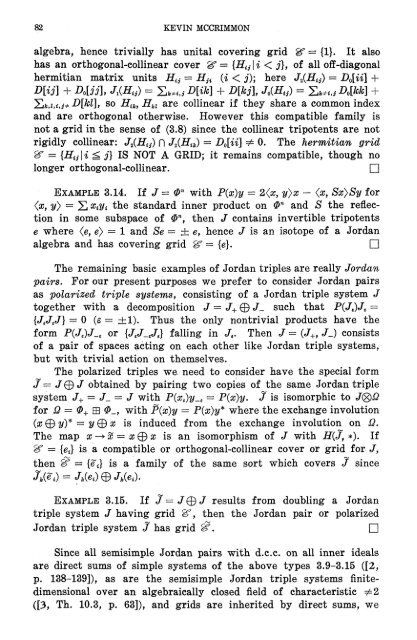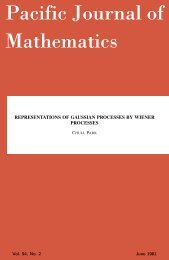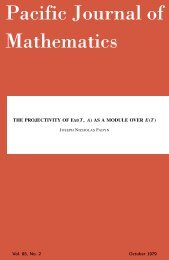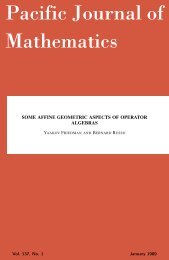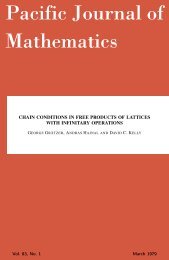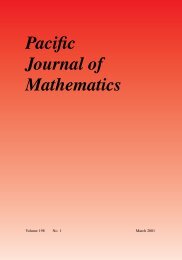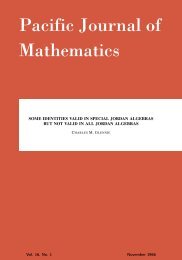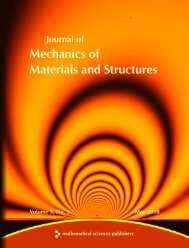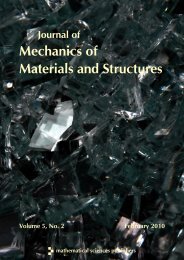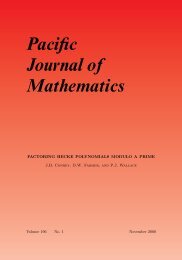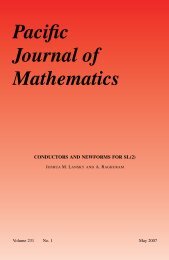Compatible Peirce decompositions of Jordan triple systems - MSP
Compatible Peirce decompositions of Jordan triple systems - MSP
Compatible Peirce decompositions of Jordan triple systems - MSP
Create successful ePaper yourself
Turn your PDF publications into a flip-book with our unique Google optimized e-Paper software.
82 KEVIN MCCRIMMON<br />
algebra, hence trivially has unital covering grid g 7 = {1}. It also<br />
has an orthogonal-collinear cover g 7 = {Hiά\i < j}, <strong>of</strong> all <strong>of</strong>f-diagonal<br />
hermitian matrix units H^ = HH (i < j); here J2{Hij) = D0[ii] +<br />
], Jx{HiS) = ΣΛΦijD[ik] + D[kj], Jmd = Σ*«.i A[**l +<br />
so Hik, Hkl are collinear if they share a common index<br />
and are orthogonal otherwise. However this compatible family is<br />
not a grid in the sense <strong>of</strong> (3.8) since the collinear tripotents are not<br />
rigidly collinear: J2(Hti) Π J2(Hik) = D0[ii] Φ 0. The hermitian grid<br />
$f = {Hij\i ^ j} IS NOT A GRID; it remains compatible, though no<br />
longer orthogonal-collinear. Π<br />
EXAMPLE 3.14. If J = Φ n<br />
with P(x)y = 2(x, y)x - (x, Sx)Sy for<br />
(x, y) = Σ ίCiί/i the standard inner product on Φ n<br />
and S the reflection<br />
in some subspace <strong>of</strong> Φ n<br />
, then J contains invertible tripotents<br />
e where (e, e) — 1 and Se = ± e, hence J is an isotope <strong>of</strong> a <strong>Jordan</strong><br />
algebra and has covering grid i? = {e}. D<br />
The remaining basic examples <strong>of</strong> <strong>Jordan</strong> <strong>triple</strong>s are really <strong>Jordan</strong><br />
pairs. For our present purposes we prefer to consider <strong>Jordan</strong> pairs<br />
as polarized <strong>triple</strong> <strong>systems</strong>, consisting <strong>of</strong> a <strong>Jordan</strong> <strong>triple</strong> system J<br />
together with a decomposition /=/+©/_ such that P(J ε)J e —<br />
{J εJ εJ} = 0 ($ = ±1). Thus the only nontrivial products have the<br />
form P(J ε)J_ ε or {e7 ε/^ e/ e} falling in J e. Then / = (J +, /_) consists<br />
<strong>of</strong> a pair <strong>of</strong> spaces acting on each other like <strong>Jordan</strong> <strong>triple</strong> <strong>systems</strong>,<br />
but with trivial action on themselves.<br />
The polarized <strong>triple</strong>s we need to consider have the special form<br />
Jψ J®J obtained by pairing two copies <strong>of</strong> the same <strong>Jordan</strong> <strong>triple</strong><br />
system J + = J_ = J with P(x ε )y_ ε = P(x)y J is isomorphic to J®Ω<br />
for Ω = Φ+ m 0_, with P{x)y — P(x)y* where the exchange involution<br />
(a?©2/)* =.y©α? is induced from the exchange involution on Ω.<br />
The map x —> x = OJ © x is an isomorphism <strong>of</strong> J with iϊ(J, *). If<br />
g* = { e J is a compatible or orthogonal-collinear cover or grid for J,<br />
then £? = {e'J is a family <strong>of</strong> the same sort which covers / since<br />
EXAMPLE 3.15. If J=JφJ results from doubling a <strong>Jordan</strong><br />
<strong>triple</strong> system J having grid g% then the <strong>Jordan</strong> pair or polarized<br />
<strong>Jordan</strong> <strong>triple</strong> system J has grid C S. •<br />
Since all semisimple <strong>Jordan</strong> pairs with d.c.c. on all inner ideals<br />
are direct sums <strong>of</strong> simple <strong>systems</strong> <strong>of</strong> the above types 3.9-3.15 ([2,<br />
p. 138-139]), as are the semisimple <strong>Jordan</strong> <strong>triple</strong> <strong>systems</strong> finitedimensional<br />
over an algebraically closed field <strong>of</strong> characteristic Φ2<br />
([3, Th. 10.3, p. 63]), and grids are inherited by direct sums, we


